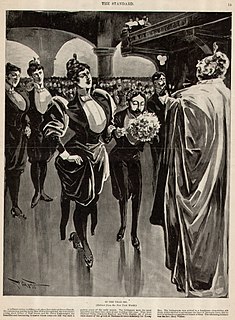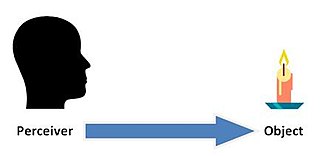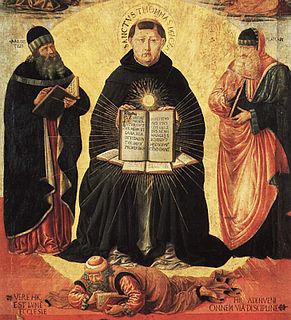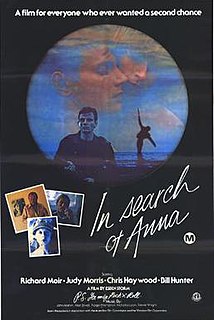Related Research Articles
Agnosticism is the view or belief that the existence of God, of the divine or the supernatural is unknown or unknowable. Another definition provided is the view that "human reason is incapable of providing sufficient rational grounds to justify either the belief that God exists or the belief that God does not exist."

A slippery slope argument (SSA), in logic, critical thinking, political rhetoric, and caselaw, is an argument in which a party asserts that a relatively small first step leads to a chain of related events culminating in some significant effect. The core of the slippery slope argument is that a specific decision under debate is likely to result in unintended consequences. The strength of such an argument depends on whether the small step really is likely to lead to the effect. This is quantified in terms of what is known as the warrant. This type of argument is sometimes used as a form of fearmongering in which the probable consequences of a given action are exaggerated in an attempt to scare the audience. However, differentiation is necessary, since, in other cases, it might be demonstrable that the small step is likely to lead to an effect.

The omnipotence paradox is a family of paradoxes that arise with some understandings of the term omnipotent. The paradox arises, for example, if one assumes that an omnipotent being has no limits and is capable of realizing any outcome, even a logically contradictory one such as creating a square circle. Atheological arguments based on the omnipotence paradox are sometimes described as evidence for countering theism. Other possible resolutions to the paradox hinge on the definition of omnipotence applied and the nature of God regarding this application and whether omnipotence is directed toward God himself or outward toward his external surroundings.
In philosophy, rationalism is the epistemological view that "regards reason as the chief source and test of knowledge" or "any view appealing to reason as a source of knowledge or justification". More formally, rationalism is defined as a methodology or a theory "in which the criterion of the truth is not sensory but intellectual and deductive".

In theology, the doctrine of divine simplicity says that God is simple. The general idea can be stated in this way: The being of God is identical to the "attributes" of God. Characteristics such as omnipresence, goodness, truth, eternity, etc., are identical to God's being, not qualities that make up that being, nor abstract entities inhering in God as in a substance; in other words, one can say that in God both essence and existence are one and the same. This is not to say that God is a simpleton or "simple" to understand. As Peter Weigel states, "Divine simplicity is central to the classical Western concept of God. Simplicity denies any physical or metaphysical composition in the divine being. This means God is the divine nature itself and has no accidents accruing to his nature. There are no real divisions or distinctions in this nature. Thus, the entirety of God is whatever is attributed to him. Divine simplicity is the hallmark of God’s utter transcendence of all else, ensuring the divine nature to be beyond the reach of ordinary categories and distinctions, or at least their ordinary application. Simplicity in this way confers a unique ontological status that many philosophers find highly peculiar." So when it comes to God's essential nature/attributes, there are no parts or accidents; this is not to be confused with, for example, God's accidental/contingent relation to the world.

In the philosophy of perception and philosophy of mind, the question of direct or naïve realism, as opposed to indirect or representational realism, is the debate over the nature of conscious experience; out of the metaphysical question of whether the world we see around us is the real world itself or merely an internal perceptual copy of that world generated by our conscious experience.

The evil demon, also known as Descartes' demon, malicious demon and evil genius, is an epistemological concept that features prominently in Cartesian philosophy. In the first of his 1641 Meditations on First Philosophy, Descartes imagines that an evil demon, of "utmost power and cunning has employed all his energies in order to deceive me." This evil demon is imagined to present a complete illusion of an external world, so that Descartes can say, "I shall think that the sky, the air, the earth, colours, shapes, sounds and all external things are merely the delusions of dreams which he has devised to ensnare my judgement. I shall consider myself as not having hands or eyes, or flesh, or blood or senses, but as falsely believing that I have all these things."

Thomism is the philosophical and theological school that arose as a legacy of the work and thought of Thomas Aquinas (1225–1274), the Dominican philosopher, theologian, and Doctor of the Church. In philosophy, Aquinas' disputed questions and commentaries on Aristotle are perhaps his best-known works.

Alex Dimitriades is an Australian actor and DJ. He is perhaps best known for his roles as Nick Polides in the 1993 romantic comedy film The Heartbreak Kid, and Nick Poulos in the 1994 television teen drama spin-off Heartbreak High.
John Scotus Eriugena or Johannes Scotus Erigena or John the Scot or John the Irish Born was an Irish Catholic Neoplatonist philosopher, theologian and poet of the Early Middle Ages. Bertrand Russell dubbed him "the most astonishing person of the ninth century". The Stanford Encyclopedia of Philosophy states he "is the most significant Irish intellectual of the early monastic period. He is generally recognized to be both the outstanding philosopher of the Carolingian era and of the whole period of Latin philosophy stretching from Boethius to Anselm."

Biblical infallibility is the belief that what the Bible says regarding matters of faith and Christian practice is wholly useful and true. It is the "belief that the Bible is completely trustworthy as a guide to salvation and the life of faith and will not fail to accomplish its purpose."

Platonism is the philosophy of Plato and philosophical systems closely derived from it, though contemporary platonists do not necessarily accept all of the doctrines of Plato. Platonism had a profound effect on Western thought. Platonism at least affirms the existence of abstract objects, which are asserted to exist in a third realm distinct from both the sensible external world and from the internal world of consciousness, and is the opposite of nominalism. This can apply to properties, types, propositions, meanings, numbers, sets, truth values, and so on. Philosophers who affirm the existence of abstract objects are sometimes called platonists; those who deny their existence are sometimes called nominalists. The terms "platonism" and "nominalism" also have established senses in the history of philosophy. They denote positions that have little to do with the modern notion of an abstract object.
The image of God is a concept and theological doctrine in Christianity, as well as in Judaism. This concept is a foundational aspect of Christian and Jewish understandings of human nature. It stems from the primary text in Genesis 1:27, which reads: "So God created man in his own image, in the image of God created he him; male and female created he them." The exact meaning of the phrase has been debated for millennia.

The philosophy of Søren Kierkegaard has been a major influence in the development of 20th-century philosophy, especially existentialism and postmodernism. Søren Kierkegaard was a 19th-century Danish philosopher who has been labeled by many as the "Father of Existentialism", although there are some in the field who express doubt in labeling him an existentialist to begin with. His philosophy also influenced the development of existential psychology.
Esben Storm was a Danish Australian actor, screenwriter, television producer, television director, voice artist and songwriter.
Two Upbuilding Discourses (1843) is a book by Søren Kierkegaard.

Four Upbuilding Discourses (1843) is a book by Søren Kierkegaard.
Claudia Leigh is a fictional character from the Australian television drama City Homicide, played by Tasma Walton. Shortly after the actress relocated to Melbourne, she was approached by producer MaryAnne Carroll to appear in the series. Carroll asked Walton whether she would be interested in a recurring role. Walton had previously turned down several acting jobs, while waiting for the right one to come along and she was cautious about taking the City Homicide role. She revealed that she did not want a repeat of her Blue Heelers character Dash McKinley. However, Walton was immediately interested in Claudia's job as a criminal profiler and her semi-regular status. Walton's casting was announced on 1 February 2009 and she made her debut screen appearance in the second season episode "Rage", which was broadcast on 22 March 2009.

In Search of Anna is a 1978 film directed by Esben Storm.
Stanley is a 1984 Australian comedy film directed by Esben Storm and starring Peter Bensley and Graham Kennedy.
References
- ↑ "Interview with Esben Storm", Signis, 22 August 1995 Archived 3 November 2013 at the Wayback Machine accessed 21 November 2012